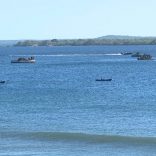Mozambican navy accused of failing to rescue research vessel attacked by terrorists - AIM report | ...
Mozambique: Islamic State threatens South Africa – AIM report

Image: cropped
The international terrorist organisation calling itself “Islamic State” (and is also known as ISIS or Daesh) has threatened to open a new front in South Africa.
An editorial in the Islamic State’s “Al-Naba” newsletter, dated 3 July, claims that “Crusader States in Europe and America” are trying to persuade the South African government and army to play a leading role in the war in the northern Mozambican province of Cabo Delgado, where terrorists aligned with Islamic State are fighting the Mozambican defence and security forces.
“Al-Naba” warns that South African involvement “will place it in a great financial, security and military predicament, and may result in prompting the soldiers of the Islamic State to open a fighting front inside its borders!- by the permission of God Almighty”.
Mozambique
al Nabaa translation accurate and precise:
This week’s editorial in al-Naba’ newsletter discusses the insurgency in Mozambique and failure of army to defeat it, as well as current and possible future external interventions by various partieshttps://t.co/AotwB2WTWk— Jasmine Opperman (@Jasminechic00) July 3, 2020
The editorial also carries oblique threats to the “Crusader oil companies who have invested billions of dollars”, claiming that “the Crusaders are risking their investment”.
The editorial is littered with absurd anachronisms such as references to “the Crusader Mozambican army”
Mozambique, it claims, “is ruled by a tyrannical gang from the atheists of Communism”. Supposedly there is nothing in the country “that interests the Crusaders besides its huge reserves of different natural resources and in which American, French and South African companies jointly invest. And Russian and Chinese companies are ambitious to find for themselves a foothold in them as well”.
Demonstrating an extraordinary ignorance of Mozambican history, it claims that “over the centuries, the Crusaders and the Communist atheists have inflicted the evil of torture on the Muslims in that abode”.
Carried away by its rhetoric, “Al-Naba” declares “the Crusaders are at a loss, for they fear that their great intervention in this war will lead to the outcome that more of the Muslims in Mozambique and its environs will join the soldiers of the Caliphate, especially as the hostility to Islam and its people in all the states of the region is great and old, just as they fear that that will lead to the spread of the blazing fire of jihad that has begun to threaten to burn idolatry and the idolaters in this region that is important for them, because of what is in it from resources and opportunities”.
“If the Crusaders reckon that they, in their support for the disbelieving government in Mozambique, will protect their investments and guarantee the continuation of their plunder of the resources of the region, they are delusional, as it won’t be too long before things become consolidated in favour of the soldiers of the Caliphate”, the editorial claims.
At one level, these ravings are laughable – but, at another, they show clearly that the uprising in Cabo Delgado is not home-grown, but an offshoot of a well-funded international terrorist grouping.
In the recent past, Islamic State suffered heavy defeats in Iraq and Syria. Now it is trying to compensate for these with advances in Africa.
It also seems that ISIS is very much following political developments in South Africa. It claims that the country should avoid involvement in Mozambique due to its ‘many domestic problems’ and that it cant financially afford a war at this time.
— Ryan Cummings (@Pol_Sec_Analyst) July 6, 2020
This is the first time LNG facilities in Afungi Peninsula are specifically mentioned in IS propaganda https://t.co/Rc9RqVf0Y0
— Piers Pigou (@PiersPigou) July 3, 2020
#ISIS Warns Western Countries: Your Investments In Mozambique Are At Risk https://t.co/AARaj2TnNN pic.twitter.com/x0FbO9Jgeg
— Jihad Threat Monitor (@memrijttm) July 6, 2020












Leave a Reply
Be the First to Comment!
You must be logged in to post a comment.
You must be logged in to post a comment.